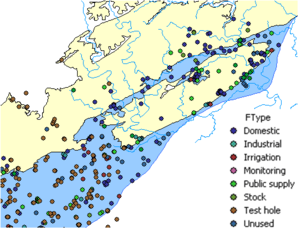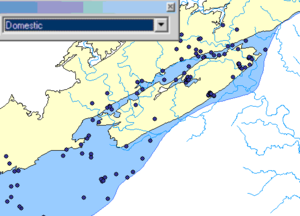AHGW:Arc Hydro Groundwater Toolbar
The Arc Hydro Groundwater Toolbar in ArcGIS is accessed by selecting Customize | Toolbars | Arc Hydro Groundwater Toolbar. As with other toolbars, it can be docked at the top of the ArcGIS window or used as a floating toolbar (see example images below). This toolbar contains a set of tools and menu commands for working with the Arc Hydro Groundwater Data Model. The toolbar appears as follows:
The following buttons and drop-down menus are available on the toolbar.
- Arc Hydro GW drop-down – Gives the following options:
- Text Import – Brings up the Open dialog, allowing a text file to be imported.
 Flow Direction Generator – Creates flow direction arrows using the selected raster dataset.
Flow Direction Generator – Creates flow direction arrows using the selected raster dataset.- Add to Raster Series – Opens the Add to Raster Series dialog.
- Make Time Series Statistics – Opens the Make Time Series Statistics dialog.
 Time Series Grapher Setup – Opens the Time Series Grapher Setup dialog.
Time Series Grapher Setup – Opens the Time Series Grapher Setup dialog.
- Subsurface drop-down – Gives the following options:
- Import GeoSection from XML – Opens the Import GeoSection from XML dialog.
- Import GeoVolume from XML – Opens the Import GeoVolume from XML dialog.
 HGU Color Manager – Opens the HGU Color Manager dialog.
HGU Color Manager – Opens the HGU Color Manager dialog. Borehole/Well Editor – Opens the Borehole/Well Editor dialog.
Borehole/Well Editor – Opens the Borehole/Well Editor dialog. Borehole/Well Advanced Editor – Opens the Borehole/Well Advanced Editor dialog.[note 1]
Borehole/Well Advanced Editor – Opens the Borehole/Well Advanced Editor dialog.[note 1]- Create BoreLines – Opens the Create Borelines dialog.
- Show or Hide Geophysical Data for Wells – Opens the Show/Hide Depth Range dialog.[note 1]
 Assign Related Identifier – Brings up the Assign Related Identifier dialog.
Assign Related Identifier – Brings up the Assign Related Identifier dialog. Time Series Grapher Setup – Brings up the Time Series Grapher Setup dialog.
Time Series Grapher Setup – Brings up the Time Series Grapher Setup dialog. Set Layer As Map Grid – Brings up the Set Layer as Map Grid dialog.
Set Layer As Map Grid – Brings up the Set Layer as Map Grid dialog. 2D Cross Section Wizard – Activates the crosshairs for placement of a 2D cross section on a section line. Clicking on a section line with the crosshairs brings up the 2D Cross Section Wizard dialog.
2D Cross Section Wizard – Activates the crosshairs for placement of a 2D cross section on a section line. Clicking on a section line with the crosshairs brings up the 2D Cross Section Wizard dialog. Import XS2D Image Wizard – Activates the crosshairs for registering a digital image for use in building a 2D cross section (XS2D). Clicking on a section line with the crosshairs brings up the Import XS2D Image Wizard dialog.
Import XS2D Image Wizard – Activates the crosshairs for registering a digital image for use in building a 2D cross section (XS2D). Clicking on a section line with the crosshairs brings up the Import XS2D Image Wizard dialog. Create Geophysical Plot Wizard – Activates the crosshairs for creating geophysical data plots for the selected section line. Clicking on a section line with the crosshairs brings up the Create Geophysical Plot Wizard dialog.
Create Geophysical Plot Wizard – Activates the crosshairs for creating geophysical data plots for the selected section line. Clicking on a section line with the crosshairs brings up the Create Geophysical Plot Wizard dialog. Create Geophysical Plot Wizard for Wells – Activates the crosshairs for creating geophysical data plots at the selected well. Clicking on a well with the crosshairs brings up the Create Geophysical Plot Wizard dialog.
Create Geophysical Plot Wizard for Wells – Activates the crosshairs for creating geophysical data plots at the selected well. Clicking on a well with the crosshairs brings up the Create Geophysical Plot Wizard dialog. Create Lithological Description Wizard – Brings up the Create Lithological Description Wizard dialog.
Create Lithological Description Wizard – Brings up the Create Lithological Description Wizard dialog. Add Borehole Image Wizard – Brings up the Add Borehole Image Wizard dialog.
Add Borehole Image Wizard – Brings up the Add Borehole Image Wizard dialog.- Field drop-downs – Used for filtering. Select a field from the first drop-down, and a field value from the second. See Definition Query Filter, below.
- Help drop-down – The following options are available:
- Open Help – Opens the Arc Hydro Groundwater wiki.
- Open Online Help – Opens the Arc Hydro Groundwater wiki.
- About... – Opens the Arc Hydro Groundwater Toolkit dialog, giving contact information for Aquaveo and version information for the Arc Hydro Groundwater Toolkit.
- Register – Opens the Register AHGW dialog for the version being used.
Definition Query Filter
The Definition Query Filter tool simplifies visualizing, analyzing, and working with data within the groundwater geodatabase by filtering a layer based on its FType attribute. For example, a set of wells imported from a state database may contain wells of multiple types (e.g., irrigation, water supply, domestic, monitoring, etc.). The well type is defined in the FType field. When visualizing and analyzing the well data, it might be useful to analyze only certain types of wells. The Definition Query Filter tool makes it easy for users to create filter-selected datasets to include only certain types of data.
By choosing the appropriate option in a combo box located on the Arc Hydro Groundwater toolbar, the layer can be immediately filtered based on its FType attribute.
Notes


